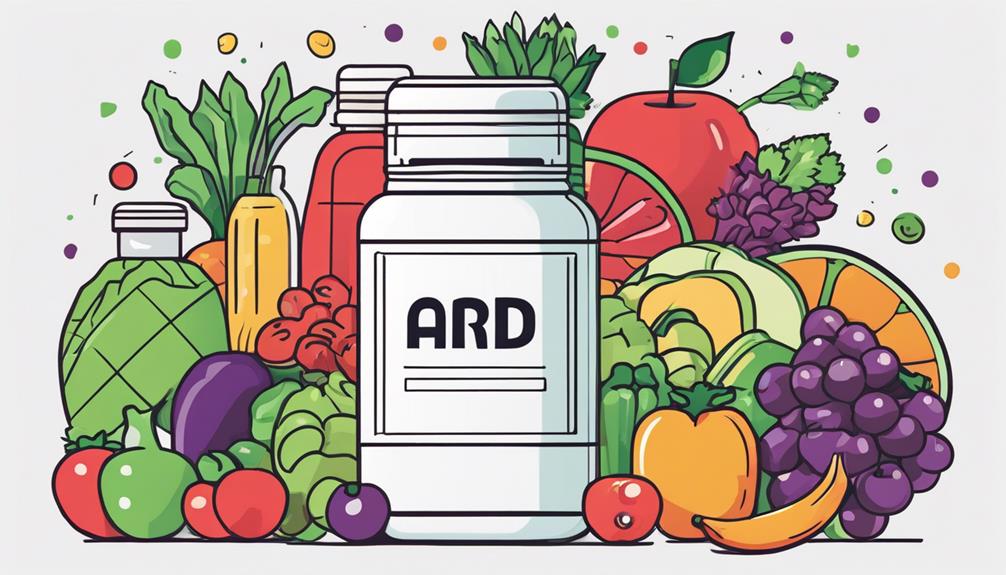Did you know that approximately 88 million adults in the United States have prediabetes, and 84% of them don't even know they have it?
Understanding the various medications available to help prevent or manage diabetes can be crucial in your health journey.
From Metformin to SGLT-2 inhibitors, these medicines play a significant role in warding off diabetes.
But which one could be the right fit for you? Let's explore the options and their benefits in detail.
Key Takeaways
- Metformin, SGLT-2 Inhibitors, GLP-1 Receptor Agonists, Thiazolidinediones, and Alpha-glucosidase Inhibitors can help prevent diabetes.
- Lifestyle modifications like healthy eating, exercise, and weight management are essential for diabetes prevention.
- Medications target insulin sensitivity, blood sugar regulation, and weight management to reduce diabetes risk.
- Consulting healthcare providers and monitoring blood sugar levels are crucial when considering diabetes prevention medications.
Metformin for Diabetes Prevention

To prevent diabetes, Metformin is a widely recognized pharmaceutical agent recommended for its proven efficacy in reducing the risk of developing the disease. Metformin works by lowering blood sugar levels and improving insulin sensitivity in the body. However, it's essential to understand that while Metformin can be beneficial, it isn't a standalone solution. Alongside medication, incorporating lifestyle modifications, dietary interventions, exercise regimens, and weight management strategies are crucial components in the prevention and management of diabetes.
When considering Metformin for diabetes prevention, it's important to remember that a holistic approach yields the best results. Making healthy food choices, engaging in regular physical activity, and maintaining a healthy weight are fundamental in reducing the risk of developing diabetes. By combining Metformin with these lifestyle changes, you can significantly enhance its effectiveness and potentially delay or even prevent the onset of diabetes. Remember, taking control of your health through a balanced approach is key in diabetes prevention.
SGLT-2 Inhibitors in Diabetes Prevention
SGLT-2 Inhibitors play a significant role in the prevention of diabetes by targeting specific mechanisms involved in glucose reabsorption in the kidneys. These inhibitors work by blocking the SGLT-2 protein responsible for reabsorbing glucose back into the bloodstream, allowing excess glucose to be excreted through urine. This mechanism helps lower blood sugar levels and reduces the risk of developing diabetes.
In addition to taking SGLT-2 Inhibitors, incorporating dietary modifications and exercise routines into your daily life can further enhance diabetes prevention. A balanced diet rich in fruits, vegetables, whole grains, lean proteins, and healthy fats can help regulate blood sugar levels and promote overall health. Regular physical activity, such as aerobic exercises, strength training, or yoga, can improve insulin sensitivity and assist in maintaining a healthy weight.
GLP-1 Receptor Agonists for Pre-Diabetes

In the realm of diabetes prevention strategies, another powerful tool to consider is the utilization of GLP-1 Receptor Agonists for individuals at risk of developing pre-diabetes. GLP-1 Receptor Agonists are medications that mimic the action of the natural hormone GLP-1, which helps regulate blood sugar levels. Research suggests that these medications not only lower blood sugar but also promote weight loss and have a protective effect on the pancreas.
When it comes to managing pre-diabetes, lifestyle modifications play a crucial role. Incorporating diet changes that focus on whole, unprocessed foods and reducing intake of sugar and refined carbohydrates can significantly impact blood sugar levels. Furthermore, establishing regular exercise routines and focusing on weight management through physical activity can improve insulin sensitivity and reduce the risk of developing diabetes.
Thiazolidinediones for Diabetes Risk Reduction
Consider incorporating thiazolidinediones into your diabetes risk reduction strategy as they've shown efficacy in improving insulin sensitivity and reducing the likelihood of developing diabetes. Thiazolidinediones, such as pioglitazone and rosiglitazone, work by targeting the peroxisome proliferator-activated receptors (PPARs) in the body, leading to increased insulin sensitivity. By enhancing the body's response to insulin, these medications help regulate blood sugar levels and reduce the risk of developing diabetes.
One of the key benefits of thiazolidinediones is their impact on weight management. These medications can lead to modest weight gain, primarily through an increase in subcutaneous fat. While weight gain can be a concern for some individuals, the improvement in insulin sensitivity often outweighs this effect. Additionally, thiazolidinediones have been shown to reduce the accumulation of visceral fat, which is particularly important as excess visceral fat is linked to insulin resistance and an increased risk of diabetes.
Incorporating thiazolidinediones into your diabetes prevention plan, alongside lifestyle modifications, can be a valuable strategy for enhancing insulin sensitivity and lowering your risk of developing diabetes.
Alpha-glucosidase Inhibitors in Diabetes Prevention

Enhancing your diabetes prevention strategy with alpha-glucosidase inhibitors can be beneficial due to their ability to slow down the absorption of carbohydrates in your digestive system, helping to manage blood sugar levels effectively. These inhibitors work by delaying the breakdown of complex carbohydrates into glucose, thus preventing sudden spikes in blood sugar after meals.
When considering their role in diabetes prevention, it's crucial to understand how they can complement other interventions. Here are some key points to consider:
- Dietary interventions: Alpha-glucosidase inhibitors can be particularly useful when paired with a balanced diet rich in complex carbohydrates, fiber, and lean proteins.
- Lifestyle modifications: Incorporating regular physical activity into your routine can enhance the effectiveness of alpha-glucosidase inhibitors in regulating blood sugar levels.
- Monitoring blood glucose: Regularly checking your blood sugar levels can help assess the impact of alpha-glucosidase inhibitors on your body.
- Consultation with healthcare providers: Always consult with your healthcare team before starting any new medication for diabetes prevention.
- Potential side effects: Be aware of potential gastrointestinal side effects like bloating or gas when using alpha-glucosidase inhibitors.
Frequently Asked Questions
Are There Any Natural Supplements or Alternative Therapies That Can Help Prevent Diabetes?
Making lifestyle changes is crucial in preventing diabetes. Herbal remedies can be effective, but consult a healthcare provider. Exercise regularly, maintain a healthy weight, and eat a balanced diet. Remember, alternatives can complement, not replace, traditional medical advice.
How Important Is Exercise in Preventing Diabetes, Compared to Medication?
Embrace the power within you to prevent diabetes through lifestyle choices. Exercise benefits go beyond medication effects by enhancing your body's resilience. Make preventive measures your daily habit and witness the transformation.
Can a Person With a Family History of Diabetes Still Prevent the Disease With Medication Alone?
While genetic predisposition influences diabetes risk, pharmaceutical intervention can help. Medications like metformin may reduce the likelihood of developing diabetes, but they are most effective when combined with a healthy lifestyle that includes diet and exercise.
Are There Any Specific Diets or Foods That Can Help Lower Diabetes Risk in Addition to Medication?
Like a skilled gardener tending to soil, making dietary modifications and lifestyle changes can significantly lower diabetes risk. Incorporating nutrient-rich foods, regular exercise, and possibly nutritional supplements or herbal remedies can help ward off this condition.
Are There Any Potential Side Effects or Long-Term Risks Associated With Using These Medications for Diabetes Prevention?
When considering medications for diabetes prevention, it's important to be aware of potential risks and long-term effects. While these medications can be effective, discussing with your healthcare provider is crucial to ensure safety and efficacy.
Conclusion
In conclusion, evidence suggests that certain medications can help ward off diabetes and reduce the risk of developing the disease.
For example, studies have shown that taking metformin can lower the risk of developing type 2 diabetes by up to 31% in high-risk individuals.
This statistic highlights the significant impact that medication can have in preventing diabetes and underscores the importance of early intervention and proactive healthcare measures.